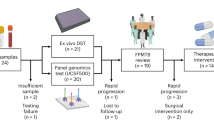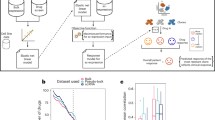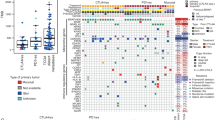Abstract
Acute myeloid leukemia (AML) is the most common diagnosed leukemia. In older adults, AML confers an adverse outcome1,2. AML originates from a dominant mutation, then acquires collaborative transformative mutations leading to myeloid transformation and clinical/biological heterogeneity. Currently, AML treatment is initiated rapidly, precluding the ability to consider the mutational profile of a patient’s leukemia for treatment decisions. Untreated patients with AML ≥ 60 years were prospectively enrolled on the ongoing Beat AML trial (ClinicalTrials.gov NCT03013998), which aims to provide cytogenetic and mutational data within 7 days (d) from sample receipt and before treatment selection, followed by treatment assignment to a sub-study based on the dominant clone. A total of 487 patients with suspected AML were enrolled; 395 were eligible. Median age was 72 years (range 60–92 years; 38% ≥75 years); 374 patients (94.7%) had genetic and cytogenetic analysis completed within 7 d and were centrally assigned to a Beat AML sub-study; 224 (56.7%) were enrolled on a Beat AML sub-study. The remaining 171 patients elected standard of care (SOC) (103), investigational therapy (28) or palliative care (40); 9 died before treatment assignment. Demographic, laboratory and molecular characteristics were not significantly different between patients on the Beat AML sub-studies and those receiving SOC (induction with cytarabine + daunorubicin (7 + 3 or equivalent) or hypomethylation agent). Thirty-day mortality was less frequent and overall survival was significantly longer for patients enrolled on the Beat AML sub-studies versus those who elected SOC. A precision medicine therapy strategy in AML is feasible within 7 d, allowing patients and physicians to rapidly incorporate genomic data into treatment decisions without increasing early death or adversely impacting overall survival.
This is a preview of subscription content, access via your institution
Access options
Access Nature and 54 other Nature Portfolio journals
Get Nature+, our best-value online-access subscription
$29.99 / 30 days
cancel any time
Subscribe to this journal
Receive 12 print issues and online access
$209.00 per year
only $17.42 per issue
Buy this article
- Purchase on Springer Link
- Instant access to full article PDF
Prices may be subject to local taxes which are calculated during checkout



Similar content being viewed by others
Data availability
The data presented represents patient enrollment between 17 November 2016 and 30 January 2018. The trial is active and continues to enroll patients. The LLS is committed to making nonconfidential, nonidentifiable data available to individuals or teams focused on advancing the therapeutic efforts for patients with AML and related blood cancers. These requests will be evaluated by the principals of Beat AML (A.B., R.L.L., B.D. and J.C.B.) for appropriateness.
References
Karjalainen, E. & Repasky, G. A. Molecular changes during acute myeloid leukemia (AML) evolution and identification of novel treatment strategies through molecular stratification. Prog. Mol. Biol. Transl. Sci. 144, 383–436 (2016).
Khwaja, A. et al. Acute myeloid leukaemia. Nat. Rev. Dis. Primers 2, 16010 (2016).
Chen, J. et al. Myelodysplastic syndrome progression to acute myeloid leukemia at the stem cell level. Nat. Med. 25, 103–110 (2019).
Desai, P. et al. Somatic mutations precede acute myeloid leukemia years before diagnosis. Nat. Med. 24, 1015–1023 (2018).
Abelson, S. et al. Prediction of acute myeloid leukaemia risk in healthy individuals. Nature 559, 400–404 (2018).
Takahashi, K. et al. Preleukaemic clonal haemopoiesis and risk of therapy-related myeloid neoplasms: a case-control study. Lancet Oncol. 18, 100–111 (2017).
Vasu, S. et al. Ten-year outcome of patients with acute myeloid leukemia not treated with allogeneic transplantation in first complete remission. Blood Adv. 2, 1645–1650 (2018).
Stone, A., Zukerman, T., Flaishon, L., Yakar, R. B. & Rowe, J. M. Efficacy outcomes in the treatment of older or medically unfit patients with acute myeloid leukaemia: a systematic review and meta-analysis. Leuk. Res. 82, 36–42 (2019).
Lübbert, M. et al. Low-dose decitabine versus best supportive care in elderly patients with intermediate- or high-risk myelodysplastic syndrome (MDS) ineligible for intensive chemotherapy: final results of the randomized phase III study of the European Organisation for Research and Treatment of Cancer Leukemia Group and the German MDS Study Group. J. Clin. Oncol. 29, 1987–1996 (2011).
Fenaux, P. et al. Azacitidine prolongs overall survival compared with conventional care regimens in elderly patients with low bone marrow blast count acute myeloid leukemia. J. Clin. Oncol. 28, 562–569 (2010).
Kantarjian, H. M. et al. Multicenter, randomized, open-label, phase III trial of decitabine versus patient choice, with physician advice, of either supportive care or low-dose cytarabine for the treatment of older patients with newly diagnosed acute myeloid leukemia. J. Clin. Oncol. 30, 2670–2677 (2012).
Stone, R. M. et al. Midostaurin plus chemotherapy for acute myeloid leukemia with a FLT3 mutation. N. Engl. J. Med. 377, 454–464 (2017).
Uy, G. L. et al. A phase 2 study incorporating sorafenib into the chemotherapy for older adults with FLT3-mutated acute myeloid leukemia: CALGB 11001. Blood Adv. 1, 331–340 (2017).
Bertoli, S. et al. Time from diagnosis to intensive chemotherapy initiation does not adversely impact the outcome of patients with acute myeloid leukemia. Blood 121, 2618–2626 (2013).
Eisfeld, A.-K. et al. Mutation patterns identify adult patients with de novo acute myeloid leukemia aged 60 years or older who respond favorably to standard chemotherapy: an analysis of Alliance studies. Leukemia 32, 1338–1348 (2018).
Becker, H. et al. Favorable prognostic impact of NPM1 mutations in older patients with cytogenetically normal de novo acute myeloid leukemia and associated gene- and microRNA-expression signatures: a Cancer and Leukemia Group B study. J. Clin. Oncol. 28, 596–604 (2010).
Koszarska, M. et al. Type and location of isocitrate dehydrogenase mutations influence clinical characteristics and disease outcome of acute myeloid leukemia. Leuk. Lymphoma 54, 1028–1035 (2013).
Yang, H. et al. Gain of function of ASXL1 truncating protein in the pathogenesis of myeloid malignancies. Blood 131, 328–341 (2018).
Mill, C. P. et al. RUNX1-targeted therapy for AML expressing somatic or germline mutation in RUNX1. Blood 134, 59–73 (2019).
Fong, J. Y. et al. Therapeutic targeting of RNA splicing catalysis through inhibition of protein arginine methylation. Cancer Cell 36, 194–209.e9 (2019).
Nguyen, H. D. et al. Spliceosome mutations induce R loop-associated sensitivity to ATR inhibition in myelodysplastic syndromes. Cancer Res. 78, 5363–5374 (2018).
Mardis, E. R. et al. Recurring mutations found by sequencing an acute myeloid leukemia genome. N. Engl. J. Med. 361, 1058–1066 (2009).
Patel, J. P. et al. Prognostic relevance of integrated genetic profiling in acute myeloid leukemia. N. Engl. J. Med. 366, 1079–1089 (2012).
Papaemmanuil, E. et al. Genomic classification and prognosis in acute myeloid leukemia. N. Engl. J. Med. 374, 2209–2221 (2016).
Eisfeld, A.-K. et al. The mutational oncoprint of recurrent cytogenetic abnormalities in adult patients with de novo acute myeloid leukemia. Leukemia 31, 2211–2218 (2017).
DiNardo, C. D. et al. Durable remissions with ivosidenib in IDH1-mutated relapsed or refractory AML. N. Engl. J. Med. 378, 2386–2398 (2018).
DiNardo, C. & Lachowiez, C. Acute myeloid leukemia: from mutation profiling to treatment decisions. Curr. Hematol. Malig. Rep. 14, 386–394 (2019).
Intlekofer, A. M. et al. Integrated DNA/RNA targeted genomic profiling of diffuse large B-cell lymphoma using a clinical assay. Blood Cancer J. 8, 60 (2018).
Frampton, G. M. et al. Development and validation of a clinical cancer genomic profiling test based on massively parallel DNA sequencing. Nat. Biotechnol. 31, 1023–1031 (2013).
van Buuren, S. Multiple imputation of discrete and continuous data by fully conditional specification. Stat. Methods Med. Res. 16, 219–242 (2007).
Acknowledgements
The investigative team thanks the patients and their caregivers who participated in this trial. The study was sponsored by the LLS, which holds the investigational new drug (IND) application for this trial. Funding for the trial was made possible by the Harry T. Mangurian Foundation, many other donors and the sites that enabled resources for rapid turnaround for cytogenetics and other monitoring requirements of patients. The IND and ultimate design and implementation of this trial came forth from integral collaboration of the LLS team and members at the FDA under the leadership of R. Pazdur, D. Przepiorka, A. Deisseroth and A. Farrell, to whom we are greatly indebted. We thank the investigators and coordinators at each of the clinical sites and the patients who participated in this trial and their families who supported them. Sub-studies in this trial were supported by the pharmaceutical sponsor. We thank the pharmaceutical sponsors who paid the cost of performing the specific sub-studies with their investigational drugs. This work was supported by the NCI (grant no. R35 CA198183 to J.C.B.; grant no. R35 CA197594 to R.L.L.) and in part through the NIH/NCI Cancer Center Support grant nos. P30 CA008748, P30CA069533 and P30 CA016058. We acknowledge many references that could not be included based on the limitations of the journal.
Author information
Authors and Affiliations
Contributions
A.B., R.L.L., B.D. and J.C.B. conceived and implemented the trial, oversaw the management and reviewed and approved the final manuscript. J.C.B., A.S.R. and A.B. wrote the first draft of the manuscript. A.S.R. and A.B.S. oversaw the statistical planning and analysis. A.S.M., U.B., E.M.S., P.P., M.R.B., W.S., M.D., W.B., G.S., R.O., M.L., J.F., T.L.L., B.B., M.B., E.T., O.O., M.A., A.W., V.H.D., T.K., R.C., A.B.S. and M.C.F. enrolled patients on the study, reviewed the drafts and approved the final manuscript. N.A.H. performed the central cytogenetic review for the study. J.-A.V., T.B., C.V., E.S., M.M., L.R., S.M., A.Y., T.C. and M.S. were part of the operation, implementation and oversight of the trial, reviewed the drafts and approved the final manuscript.
Corresponding author
Ethics declarations
Competing interests
A.B., S.M., L.R. and A.Y. are employees of LLS. LLS receives funding from AbbVie, Agios Pharmaceuticals, Alexion Pharmaceuticals, Amgen, Astellas Pharma, AstraZeneca, Boehringer Ingelheim International, Boston Biomedical, Bristol Myers Squibb, Celgene, Genentech, Gilead Sciences, ImmunoGen, Jazz Pharmaceuticals, Johnson & Johnson, Novartis, Pfizer, Pharmacyclics, RTI Health Solutions, Shire and Takeda. R.L.L. has served on the supervisory board of QIAGEN, the scientific advisory boards of Loxo Oncology (until 2019), Imago BioSciences, Mission Bio, Mana Therapeutics, Auron Therapeutics, C4 Therapeutics and Isoplexis (including equity interest). He has received research support from and consulted for Celgene and Roche, was a consultant for Incyte Corporation, Eli Lilly and Company, Janssen Pharmaceutica, Astellas Pharma, MorphoSys and Novartis, and has received research support from Prelude Therapeutics and honoraria from AstraZeneca, Roche, Eli Lilly and Company and Gilead Sciences. A.S.M. has served on the advisory boards of Jazz Pharmaceuticals, AbbVie/Genentech, Astellas Pharma, PTC Therapeutics, Novartis, Agios Pharmaceuticals and Syndax Pharmaceuticals. U.B. has been a consultant for Genetech, Daiichi Sankyo, Takeda, Pfizer, AbbVie/Genetech and Novartis. E.M.S. has served on the advisory boards of Astellas Pharma, AbbVie, Genentech, Daiichi Sankyo, Novartis, Amgen, Seattle Genetics, Syros Pharmaceuticals, Syndax Pharmaceuticals, Agios Pharmaceuticals and Celgene. He is an equity holder in Auron Therapeutics. P.P. has served on the advisory board of Agios Pharmaceuticals. W.S. has served on the advisory boards of Astellas Pharma, Agios Pharmaceuticals, Kite Pharma, Jazz Pharmaceuticals, Servier, MorphoSys and Amgen, and has received speaking honoraria from AbbVie and Pfizer. M.D. has served on the advisory boards of Blueprint Medicines, Takeda, Incyte Corporation and Sangamo Therapeutics. He has been a consultant for Blueprint Medicines, Fusion Pharmaceuticals, Medscape, Novartis, Sangamo Therapeutics and DisperSol Technologies and has received research funding from Blueprint Medicines, Takeda, Novartis, Incyte Corporation, Sun Pharma Advanced Research Company and Pfizer. He has served on the study management committees of Blueprint Medicines and Takeda. W.B. has received research funding from Forma Therapeutics, Xencor and Celyad Oncology and honoraria from AmerisourceBergen. G.S. has served on the advisory boards of Incyte Corporation, ElevateBio, AbbVie, Karyopharm Therapeutics, ONO Pharma UK, Novartis, Evidera, Agios Pharmaceuticals, AstraZeneca, NCI and FDA. He has received research funding from AbbVie, Agios Pharmaceuticals, Actinium Pharmaceuticals, Ambit Biosciences, Amgen, ARIAD Pharmaceuticals, Astellas Pharma, LLS, BioMed Valley Discoveries, Bristol Myers Squibb, Celator Pharmaceuticals, Celgene, Constellation Pharmaceuticals, Forma Therapeutics, Cyclacel Pharmaceuticals, Daiichi Sankyo, Deciphera Pharmaceuticals, California Institute for Regenerative Medicine, Gamida Cell, Gilead Sciences, Incyte Corporation, Janssen Pharmaceutica, Karyopharm Therapeutics, Kite Pharma, Mateon Therapeutics, MedImmune, Millenium, National Marrow Donor Program, NIH, Novartis, Onconova Therapeutics, Onyx Pharmaceuticals, Pfizer, Sangamo Therapeutics, Stemline Therapeutics, Tolero Pharmaceuticals, Trovagene (Cardiff Oncology), University of California, Davis, University of California, San Diego and the University of California Hematologic Malignancies Consortium. He has received stock from Amgen, Bristol Myers Squibb, Pfizer and Johnson & Johnson. He has served on the speakers’ bureaux of Agios Pharmaceuticals, Amgen, Astellas Pharma, Bristol Myers Squibb, Celgene, Sanofi Genzyme, Incyte Corporation, Janssen Pharmaceutica, Jazz Pharmaceuticals, Kite Pharma (Gilead Sciences), Pharmacyclics and Stemline Therapeutics. R.O. has been a consultant for and received honoraria from Jazz Pharmaceuticals, Genentech, Amgen and Revolution Medicines and has received research funding from Daiichi Sankyo, Astellas Pharma, Pfizer, Genentech, Takeda, Novartis, AstraZeneca, MedImmune (AstraZeneca), Spectrum Pharmaceuticals and Mirati Therapeutics. J.F. has been on the advisory boards of Novartis, Servier and Pfizer. He has been a consultant for Revolution Medicine and has received research funding from AbbVie, Boehringer Ingelheim, Actinium Pharmaceuticals, Aprea Therapeutics, Aptose Biosciences, H3 Biomedicine, Kura Oncology, Tolero Pharmaceuticals, Trillium Therapeutics, Xencor and Takeda/Millennium. E.T. has served on the advisory boards of AbbVie, Astellas Pharma, Genentech, Agios Pharmaceuticals and Daiichi Sankyo. He has received clinical trial support from Janssen Pharmaceutica and clinical trial funding and sponsored research from Incyte Corporation. He holds equity in Notable Labs. O.O. has served on the advisory boards of AbbVie, Celgene and Impact Biomedicines. She has received research funding from AbbVie, AstraZeneca, Astex, Agios Pharmaceuticals, Celgene, CTI BioPharma, Incyte Corporation, Janssen Pharmaceutica, Kartos Therapeutics, NS Pharma and OTS. M.A. has served on the advisory boards of Gilead Sciences and Syndax Pharmaceuticals. M.C.F. has been a consultant for Agios Pharmaceuticals, MacroGenics and Daiichi Sankyo and has received research funding from the LLS. J.-A.V. is an employee of Foundation Medicine, a wholly owned subsidiary of Roche Holdings and with equity interest in Roche Holdings. E.S. is an employee of Foundation Medicine with equity interest in Roche Holdings. B.D. has served on the scientific advisory boards of Aileron Therapeutics, Therapy Architects (ALLCRON), Cepheid, Vivid Biosciences, Celgene, RUNX1 Research Program, EnLiven Therapeutics, Gilead Sciences (inactive), Monojul (inactive). He has served on the scientific advisory boards of and received stock from Aptose Biosciences, Blueprint Medicines, Iterion Therapeutics, Third Coast Therapeutics, GRAIL (scientific advisory board, inactive). He is the scientific founder of MolecularMD (inactive, acquired by ICON). He has served on the board of directors of and received stock from Amgen. He has served on the board of directors of Burroughs Wellcome Fund and CureOne, the joint steering committee of Beat AML LLC. He is the founder of VBL Therapeutics, has received clinical trial funding from Novartis, Bristol Myers Squibb and Pfizer and royalties from patent no. 6958335 (Novartis exclusive license), OHSU and the Dana-Farber Cancer Institute (one Merck exclusive license). J.C.B. has received research support from Janssen Pharmaceutica, Genentech, Acerta Pharma and Pharmacyclics and has served on the advisory board of Syndax Pharmaceuticals. He has received funding from the NCI (grant no. R35 CA198183) and in part through an NIH/NCI Cancer Center Support grant no. P30 CA008748. M.R.B., R.C., T.K., B.B., M.B., T.B., V.H.D., N.A.H., M.L., M.M., A.S.R., A.B.S., M.S., T.L.L., C.V. and A.W. declare no conflicting interests.
Additional information
Editor recognition statement Javier Carmona was the primary editor on this article, and managed its editorial process and peer review in collaboration with the rest of the editorial team.
Publisher’s note Springer Nature remains neutral with regard to jurisdictional claims in published maps and institutional affiliations.
Supplementary information
Supplementary Information
Supplementary Tables 1–11 and Figs. 1 and 2.
Rights and permissions
About this article
Cite this article
Burd, A., Levine, R.L., Ruppert, A.S. et al. Precision medicine treatment in acute myeloid leukemia using prospective genomic profiling: feasibility and preliminary efficacy of the Beat AML Master Trial. Nat Med 26, 1852–1858 (2020). https://doi.org/10.1038/s41591-020-1089-8
Received:
Accepted:
Published:
Issue Date:
DOI: https://doi.org/10.1038/s41591-020-1089-8
This article is cited by
-
Mapping AML heterogeneity - multi-cohort transcriptomic analysis identifies novel clusters and divergent ex-vivo drug responses
Leukemia (2024)
-
Transcriptome free energy can serve as a dynamic patient-specific biomarker in acute myeloid leukemia
npj Systems Biology and Applications (2024)
-
Experiences of treatment decision-making among older newly diagnosed adults with acute myeloid leukemia: a qualitative descriptive study
Supportive Care in Cancer (2024)
-
Novel scheme for defining the clinical implications of TP53 mutations in myeloid neoplasia
Journal of Hematology & Oncology (2023)
-
NGS-defined measurable residual disease (MRD) after initial chemotherapy as a prognostic biomarker for acute myeloid leukemia
Blood Cancer Journal (2023)



